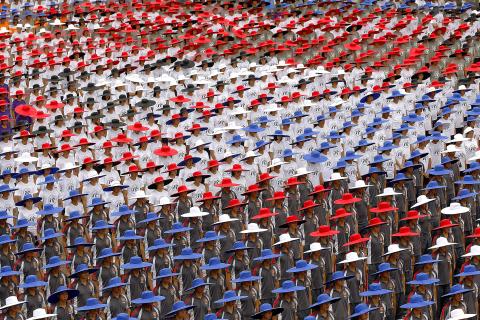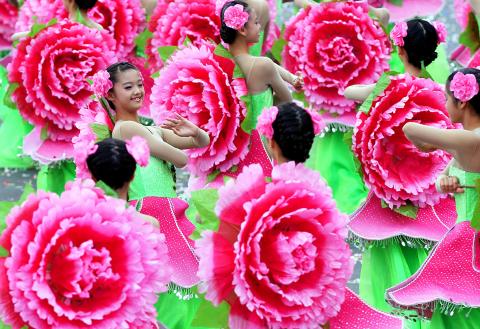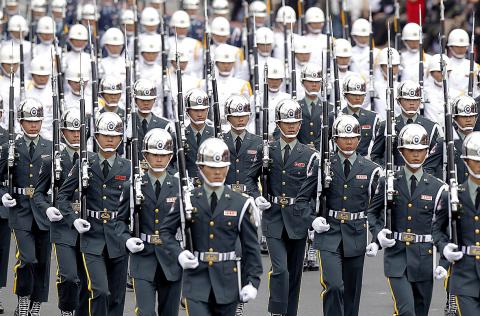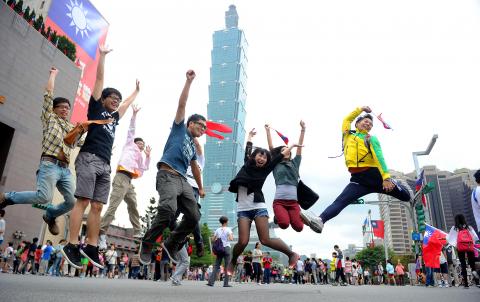President Ma Ying-jeou (馬英九) pledged yesterday to work through the economic crisis and open up Taiwan’s market to more foreign investment, promising to address public concerns by presenting solid solutions to stagnant salaries and high unemployment.
In his National Day address titled “Forging Ahead Together with Composure in the Face of Adversity,” Ma sought to tackle economic issues and said his administration would focus its efforts on boosting the development of service industries, raising salaries and eliminating investment barriers to create more job opportunities.
“To bolster of national security and Taiwan’s interests, we will relax regulations on foreign investments to create a friendlier and more convenient investment environment. In the future, liberalization will become the norm and barriers the exception,” Ma said at a National Day ceremony in front of the Presidential Office.

Photo: Pichi Chuang, Reuters
Ma said relaxing regulations on foreign investment would create a better investment environment and more jobs, and he promised that the government would strike a balance between labor rights and foreign investment.
“Although Taiwan’s economy has grown over the past years, many people have seen their salary remain stagnant and are not happy about that. To resolve this difficult situation, our industries must move toward higher value-added development,” he said.
Amid growing concerns about a low average salary and high unemployment rate, the president said that to make a breakthrough, the nation must restructure its industries and become a major provider of precision instruments, while strengthening the development of service industries.

Photo: Mandy Cheng, AFP
On cross-strait relations, Ma said the government would continue to push cross-strait development forward on the basis of the [so-called] “1992 consensus,” whereby each side acknowledges the existence of “one China,” but maintains its own interpretation of what that means.
As the two sides of the Taiwan Strait continue cross-strait negotiations following the signing of the Economic Cooperation Framework Agreement, the government plans to review and revise the Act Governing Relations between the People of the Taiwan Area and the Mainland Area (臺灣地區與大陸地區人民關係條例) and set up offices on each side of the Strait to serve the needs of businesspeople, students and the general public, he said.
In his address, the president also reiterated the nation’s sovereignty over the Diaoyutai Islands (釣魚台) and renewed his call for all parties to resolve the dispute peacefully.

Photo: Pichi Chuang, Reuters
The official celebration of National Day was held in a relatively low-key fashion, with the organizers cutting down the scale of the performances in front of the Presidential Office, while the crowds were thin.
The ceremony began with a 15-minute show by more than 400 members of the Ministry of National Defense Honor Guard and the Joint Military Marching Band, winning rounds of applause for their demonstration of rifle-twirling skills and drumming.
The performance ended with the servicemen forming the figure 101 in honor of the nation’s anniversary.

Photo: CNA
Ma and Vice President Wu Den-yih (吳敦義) met with foreign guests inside the Presidential Office before attending the ceremony.
First lady Chow Mei-ching (周美青), who had drawn criticism when she wore the same dress to the two previous National Day ceremonies, accompanied Ma in a new dress with floral prints in black and white.

The CIA has a message for Chinese government officials worried about their place in Chinese President Xi Jinping’s (習近平) government: Come work with us. The agency released two Mandarin-language videos on social media on Thursday inviting disgruntled officials to contact the CIA. The recruitment videos posted on YouTube and X racked up more than 5 million views combined in their first day. The outreach comes as CIA Director John Ratcliffe has vowed to boost the agency’s use of intelligence from human sources and its focus on China, which has recently targeted US officials with its own espionage operations. The videos are “aimed at

STEADFAST FRIEND: The bills encourage increased Taiwan-US engagement and address China’s distortion of UN Resolution 2758 to isolate Taiwan internationally The Presidential Office yesterday thanked the US House of Representatives for unanimously passing two Taiwan-related bills highlighting its solid support for Taiwan’s democracy and global participation, and for deepening bilateral relations. One of the bills, the Taiwan Assurance Implementation Act, requires the US Department of State to periodically review its guidelines for engagement with Taiwan, and report to the US Congress on the guidelines and plans to lift self-imposed limitations on US-Taiwan engagement. The other bill is the Taiwan International Solidarity Act, which clarifies that UN Resolution 2758 does not address the issue of the representation of Taiwan or its people in

US Indo-Pacific Commander Admiral Samuel Paparo on Friday expressed concern over the rate at which China is diversifying its military exercises, the Financial Times (FT) reported on Saturday. “The rates of change on the depth and breadth of their exercises is the one non-linear effect that I’ve seen in the last year that wakes me up at night or keeps me up at night,” Paparo was quoted by FT as saying while attending the annual Sedona Forum at the McCain Institute in Arizona. Paparo also expressed concern over the speed with which China was expanding its military. While the US

SHIFT: Taiwan’s better-than-expected first-quarter GDP and signs of weakness in the US have driven global capital back to emerging markets, the central bank head said The central bank yesterday blamed market speculation for the steep rise in the local currency, and urged exporters and financial institutions to stay calm and stop panic sell-offs to avoid hurting their own profitability. The nation’s top monetary policymaker said that it would step in, if necessary, to maintain order and stability in the foreign exchange market. The remarks came as the NT dollar yesterday closed up NT$0.919 to NT$30.145 against the US dollar in Taipei trading, after rising as high as NT$29.59 in intraday trading. The local currency has surged 5.85 percent against the greenback over the past two sessions, central